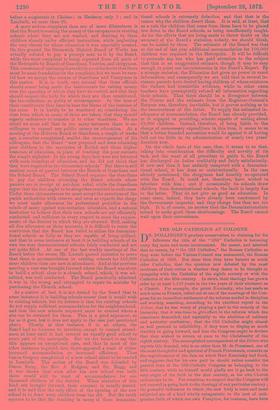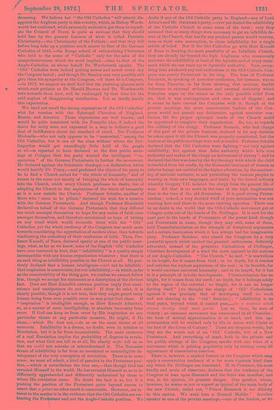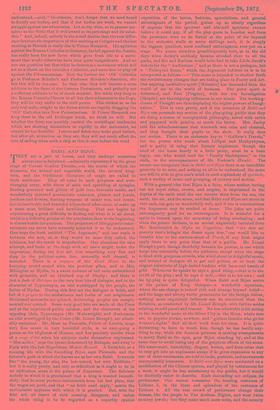THE OLD CATHOLICS AT COLOGNE.
DR. DOLLINGER'S prudent conservatism in claiming for his followers the title of the "Old" Catholics is becoming every clay more and more inconvenient. He meant, and asserted that he meant, by "the Old Catholics," the Roman Catholics as they were before the Vatican Council was summoned, the Roman Catholics of 1869. But since then they have become so much older Catholics, that the question now debated by the most moderate of their critics is whether they desire to be thought in sympathy with the Catholics of the eighth century or with the Catholics of the fifth century. In short, their theology has grown older by at least 1,100 years in the two years of their existence as a Church. For example, the priest Kaminsky, who has made so much noise in Prussia, called out at one of the meetings of the Con- gress for an immediate settlement of the reforms needed in discipline and worship, asserting, according to the excellent report in the Debats, that he was weary of playing a part in the comedy of the hierarchy, that it was time to give effect to the reforms which the conscience demanded, and especially to the abolition of celibacy and auricular confession; that the Old Catholics might almost as well pretend to infallibility, if they were to display so much timidity in going forward, and that the Congress ought to declare that they wished to return at once to the Christianity of the eighth century. The accomplished correspondent of the Debats who reports this demand, who is no other than M. de Preowned, one of the most thoughtful and spiritual of French Protestants, remarks on the capriciousness of the date on which Herr Kaminsky had fixed, and suggests that for his own part he should rather consider the general tone of the Old-Catholic Congress as belonging to the fifth century, while he himself would gladly see it go back to the very origin of the faith in the first century, as his own Church endeavours to do. For ourselves, we suspect that the Congress will not succeed in going back to the theology of any particular century ; the powerful influences to which the new body is more and more subjected are of a kind wholly antagonistic to the sort of anti- widen faith of which our own Puseyites, for instance, have been
dreaming. We believe hat "the Old Catholics" will utterly dis- appoint the Anglican party in this country, which, as Bishop Words- worth has confessed, while extremely anxious to get them to repudi- ate the Council of Trent, is quite as anxious that they should hold fast by the general features of what is called Patristic Christianity,—the Christianity of the Fathers ; and that they will before long take up a position much nearer to that of the German Catholics of 1846,—the Ronge school of rationalising Christians who held to the name of " Catholic " only for the sake of the comprehensiveness which the word implied,—than to that of the Anglo-Catholics on whose behalf Dr. Wordsworth speaks. The ' Old ' Catholics were indeed getting newer and newer every day the Congress lasted ; and though Dr. Stanley may very possibly still give them his sympathy at the Congress, —if there be a Congress, —in 1873, we suspect we shall find that the yearning glances with which such prelates as Dr. Harold Browne and Dr. Wordsworth turn towards them now, will be exchanged by that time for the cold neglect of disapproving recollection. Let us briefly justify this expectation.
We need not recall the strong expressions of the Old Catholics' wish for reunion with the Episcopal Churches of England, Russia, and America. Those expressions are well known, and would be quite consistent with the Puseyite idea, if indeed the desire for unity were not expressed in a way to indicate a good deal of indifference about the standard of creed. But Professor Michaelis—who not only appears to be "somewhat," among the Old Catholics, but is one of the class without whom the Dol- lingerites would get exceedingly little hold of the people at all—is reported to have declared at the first public meet- ings at Cologne that the party wanted the intelligent " co- operation " of the German Protestants to further the movement. He declared against the Scholastic theology,—a declaration which would horrify Dr. Pusey,—and professed the object of his party to be to find a Church suited for "the whole of humanity," and of course in the sense not merely of bringing the whole of humanity into the Church, which every Church professes to desire, but of adapting the Church to the aspirations of the whole of humanity as it is now outside the Church. Professor Schulte, another of those who "seem to be pillars," declared his wish for a reunion with the German Protestants. And though Professor Bluntschli declared on behalf of the German Protestants that they differed too much amongst themselves to hope for any union of faith even amongst themselves, and therefore entertained no hope of hitting on any creed which would reconcile them with the " Old " Catholics, yet the whole tendency of the Congress was much more towards conciliating the approbation of modern ideas, than towards vindicating the orthodoxy of their confession of faith. Thus, Pro- fessor Knoodt, of Bonn, declared openly at one of the public meet- ings, what, as far as we know, none of the English' Old' Catholics have ever ventured to hint, that " infallibility " is a quality simply incompatible with any human organisation whatever ; that there is no such thing as infallibility possible in the Church at all. He posi- tively declared that a human intelligence could not be infallible ; that inspiration is conceivable, but not infallibility,—in which, as far as the conceivability of the thing goes, we confess we cannot follow him, though we accept his statement as a description of the obvious fact. Does not Herr Knoodt's extreme position imply that omni- science and omnipotence do not exist ? If they do exist, it is clearly possible, though it is not true, that they might guard every human being from even possible error on any point God chose. If " inspiration " is intelligible enough, as Herr Knoodt admitted, so, as a matter of mere intelligibility, is absolute immunity from error. If God can keep us from error by His inspiration on any particular theme at any particular moment, He might, if He chose,—which He does not,—do so on the same theme at all moments. Infallibility is a dream, no doubt, even in relation to Revelation, but it is far from inconceivable. The mere existence of a real Revelation implies the probability of aegrees in revela- tion, and what God can tell us at all, He clearly might tell us so that we could not mistake or misunderstand it. The Romanist dream of infallibility is far from an unnatural or unintelligible de- velopment of the very conception of revelation. There is in some sense, we must all admit, a kind of paradox in the Protestant posi- tion,—which is nevertheless the true one,—that though God has revealed Himself to the world, He has revealed Himself so as to be differently apprehended and differently understood by those to whom His revelation came. No doubt the fact is so, but it is pushing the position of the Protestant quite beyond reason to assert that a priori no other result is conceivable. However, our in- terest in the matter is in the evidence that the Old Catholics are em- bracing the Protestant and not the Anglo-Catholic position. We doubt if any of the Old Catholic party in England—any of Lord Acton's and Mr. Oxenham's party,—ever yet denied the infallibility of the Catholic Church in some sense of the term ; only they assumed that so many things were necessary to get an infallible de- cree of the Church, that hardly any prudent person would venture, even on their own assumption, to claim infallibility for a single article of belief. But if the Old Catholics go with Herr Knoodt of Bonn in denying the mere possibility of an Infallible Church, they are already far beyond the high Anglicans who strenuously maintain the infallibility at least of the Apostles and of every state- ment which we can trace up to Apostolic authority. Now, every- thing that awakened any real enthusiasm in the Old Catholic Con- gress was purely Protestant in its ring. The tone of Professor Friedrich, in speaking of auricular confession, for instance, was so far from Puseyite, so far from showing that anxious, fearful deference to external ordinances and external authority which Puseyism urges on the sinner as the only possible relief from sin, that it was contemptuous and even one of disgust ; and it seems to have carried the Congress with it, though at the private meetings the more conservative leaders of the Con- gress would not permit any declaration against auricular con- fession till the proper episcopal heads of the Church could be appointed to complete their organisation. So, too, as regards the celibacy of the clergy. Professor Reussch, who had charge of this part of the private business, declined to let any decision be taken upon it till the Church was properly constituted, but the leaders at the public meetings were not so careful. Professor Schulte declared that the Old Catholics were fighting "not only against infallibility, but against that false authority which kills true authority and makes of the clergy an instrument of slavery"; and he declared that this was done by the dry theology with which the child is shackled from his cradle, by the Romanist treatment of women as inferior beings not entitled to the higher education, by the smother- ing of national instincts, in not permitting the various peoples to worship in their own languages, and lastly, by the forced celibacy whereby Gregory VII. isolated the clergy from the general life of man. 'All that is no more in the tone of the high Anglicanism than in the tone of the old Romanism. It is good strong Protes- tantism ; indeed, a very decided whiff of pure rationalism was not wanting here and there to the more exciting speeches. There can be no doubt in the world that the Old-Catholic movement got at Cologne quite out of the hands of Dr. Dollinger. It is now for the most part in the hands of Protestants of the purest kind, though not Protestants in name, though they may still, some of them, hold Transubstantiation on the strength of Scriptural arguments and a certain fascination which it has always had for imaginative piety. Professor Reinken, who closed the Congress by a very powerful speech which excited the greatest enthusiasm, definitely advocated, instead of the primitive Catholicism of Dollinger, Christian development of a kind the most opposed to the notions of our Anglo-Catholics. "The Church," he said, "is marvellous in its height, for it comes from God ; in its depth, for it reaches and satisfies the highest aspirations of the soul ; in its breadth, for it would embrace universal humanity; and in its length, for it has in it a principle of infinite development. Ultramontanism has no height, for it comes from the earth ; no depth, for it belongs solely to the region of the external ; no length, for it can no longer develop itself" [we thought the charge of 'Old' Catholicism against it was precisely that of developing itself too much and not cleaving to the " old " doctrine] ; "infallibility is its final point, beyond which it cannot pass,—for a doctrine which cannot develop itself must perish. Let us, then, be sure of victory ; an immense movement has commenced in all Churches ; the hour of mutual approximation is at hand, and this ap- proximation will be realised only by life in union with Christ at the foot of the Cross of Calvary." These are eloquent words, but they are the words not of an ' Old ' Catholic, but of a New Protestant. And everything of mark, both in the private and the public sittings of the Congress, speaks with one voice of a movement which is gaining popularity only by casting away all appearance of conservative reserves.
There is, however, a marked feature in the Congress which may apply a conservative tendency of a far more vigorous kind than any which Dr. Dollinger can command. M. de Pressense, the most kindly and acute of observers, declares that the tendency of the Congress to lean upon Bismarck and the State was manifest, and was, in his opinion, its greatest danger. One speaker, whew, however, be warns us not to regard as typical of the main body of the new Church, called out, "Prince Bismarck is too dilatory in this matter. We want here a General Moltke." Another speaker at one of the private meetings,—one of the leaders, as we
understand,—said, "Gentlemen, don't forget that we need bread to fortify our bodies, and that if our bodies are weak, we cannot struggle against our adversaries. Let us try, then, so to present our- selves to the State that it will award as its patronage and its subsi- dies." And, indeed, nobody in the world doubts that the vast differ- ence between the importance of this meeting at Cologne and the last meeting at Munich is really due to Prince Bismarck. His agitation against the Roman Catholics in Germany, his bill against the Jesuits, has really been the new force which gave fresh life to a move- ment that would otherwise have been quite insignificant. And no one can question but that what he desires is a movement which will act as a check on the orthodox Catholics, and serve him to play off against the Ultramontanea. Now the further the 'Old' Catholics go in Professor Schulte's and Professor Reinken's direction, the less this will be the case. In that case they will become a mere addition to the force of the German Protestants, and probably- not a sufficient addition to be of much moment. But while they keep to the Roman Catholic Church in all but their adherence to the Pope, they will be very useful to the civil power. This strikes us as the only real make-weight to the forces which are rapidly dragging the ' Old ' Catholics into New Protestantism. If Prince Bismarck can keep them in the old Dollinger track, we think he will. But whether the State can possibly control the centrifugal tendencies which are showing themselves so rapidly in the movement, we cannot be too doubtful. Loaves and fishes may make good ballast, but after all, attractive as they are, they will not much affect the rate of sailing when such a ship as this is once before the wind.




































 Previous page
Previous page